The People of the Ruins (16)
By:
September 6, 2012
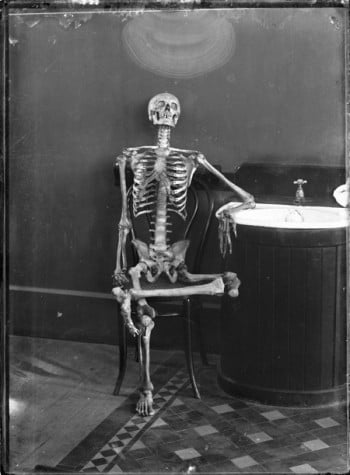
HILOBROW is pleased to present the sixteenth and final installment of our serialization of Edward Shanks’ The People of the Ruins: A Story of the English Revolution and After.
Trapped in a London laboratory during a worker uprising in 1924, ex-artillery officer and physics instructor Jeremy Tuft awakens 150 years later — in a neo-medieval society whose inhabitants have forgotten how to build or operate machinery. Not only have his fellow Londoners forgotten most of what humankind used to know, before civilization collapsed, but they don’t particularly care to re-learn any of it. Though he is at first disconcerted by the failure of his own era’s smug doctrine of Progress, Tuft eventually decides that post-civilized life is simpler, more peaceful. That is, until northern English and Welsh tribes threaten London — at which point he sets about reinventing weapons of mass destruction.
Shanks’ post-apocalyptic novel, a pessimistic satire on Wellsian techno-utopian novels, was first published in 1920. In October, HiLoBooks will publish a beautiful new edition of The People of the Ruins, with an introduction by Tom Hodgkinson.
SUBSCRIBE to HILOBROW’s serialized fiction via RSS.
LAST WEEK: “Somehow he had been launched flying at random through the centuries and had fallen at the side of this one woman. Life might do with them what chance directed; but they had met, and out of that meeting had arisen their love, which was a stable and eternal thing, which he felt to be unmoved even in these death-throes of a world.”
ALL EXCERPTS: 1 | 2 | 3 | 4 | 5 | 6 | 7 | 8 | 9 | 10 | 11 | 12 | 13 | 14 | 15 | 16
THE ROMAN ROAD
That night was one of the cold and starry nights which sometimes fall on the downs in the middle of summer. As they began to climb up the slope, the earth seemed to be returning in warm, almost tangible waves, the heat it had received during the day from the sun. But when they got clear of the gloomy beech groves on the lower slopes, when the uneven track had failed them and left them in the middle of a great sweep of open grass, this ceased, and the air grew gradually cooler. Presently the wind, which had fallen at dusk, rose again, coming from another direction, faint but chilly. The motion of the air could hardly be felt, yet it had in it some quality which touched and stayed the blood and enervated the spirit. These hours of darkness promised, before they were done, to reduce the fugitives to a lower state of wretchedness than they yet had suffered.
When they had stumbled for some time up the steeply rising hill-side which bore only small and scattered patches of gorse and juniper, Jeremy realized that they were now as far from the road as they needed to be, and that it would be impossible for them to walk on much longer. He looked about him for some shelter in which they might pass the night and not be immediately obvious to any searcher when day broke. But he could see none; and he began to be troubled in his mind, for he dared not halt lest exhaustion should pin them in the open where they stood. He scanned eagerly every patch of bush that they passed; but all were too thin and too much exposed. At last on his left he thought he saw a line dark against the dark sky, which might perhaps be a wood. He pulled gently at the old man’s arm and directed their steps towards it. When they came close it proved to be a thick grove of bushes and low thorn trees, running on either hand out of the narrow limits of their sight.
“This will do well enough,” he said in the murmured voice of pre-occupation; and Eva assented with a single word.
They pushed their way through the close growth, and came suddenly on a steep bank three or four yards from the edge of the thicket.
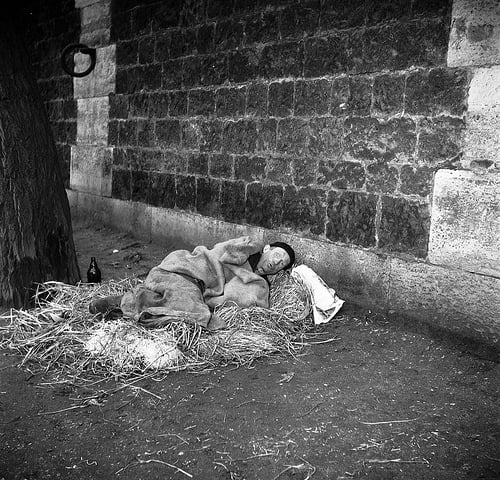
“This will do!” Jeremy cried in a heartier tone; and he explained that he wished to be well hidden by bushes, but not so much shut in that in the morning they could not get a clear view of the country around them. But, while he was explaining all this, Eva was gently laying down the Speaker, so that his head rested against the bank, and making for his head a pillow out of her cloak. Jeremy silently gave her his own cloak, with which she covered the sleeping or comatose old man. When she had finished she stood up, shivered slightly, and folded her arms as if to retain the last vanishing sparks of warmth in her body. Jeremy, standing also, quiet and somber, felt a wave of inexpressible emotion rise in his heart at the sight of her slender and shadowy figure.
“Eva… Eva…” he murmured, and she came into his arms as though that had been the homing-cry. They had no words to use with one another. They kissed once, and then stood locked in his embrace, Eva’s face pressed into his shoulder, one of his broad hands on her hair, the other at her waist. After a little while he pressed her head gently backwards, bent the supple waist and lowered her on to the ground as tenderly as she had lowered her father. She suffered what he did without speaking or resisting, and allowed him to move her head so that it rested on a thick tuft of grass, and to wrap her riding skirt tightly about her ankles. For a moment after he had done the silence endured, and Jeremy thought that, even thus, after the fatigues of the day, she would not find it hard to sleep. But when she saw him standing, square, black and aloof, between her and the stars, she called out to him softly.
“Jeremy! Jeremy! come down to me!” He knelt by her side, and laid one hand on her arm, conscious, as he made it, of the clumsiness and inexpressiveness of the gesture. “Lie down by me,” she went on. “The night will be cold, and we shall keep one another warm.”
After the first exquisite exhilaration of finding himself at her side, limb to limb, cheek to cheek, clasped in her arms as she in his, the faculty of reckoning minutes and hours vanished from his mind. This seemed to him an image of the eternal night which descends on all. He had a vision of a shrouded figure pacing an endless corridor and pausing for the length of a human life between one step and the next. Only the slow, unintermittent rhythm of the girl’s breathing suggested to him that time passed. He stirred slightly in her arms: he wished to look up at the sky.
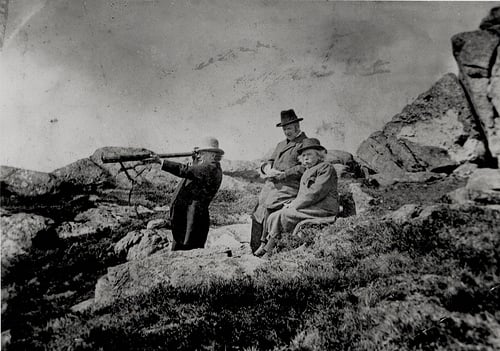
At their heads stood a low hawthorn, beaten, stunted, and misshapen by many fierce winds, which threw out its sprawling branches over them; and close to their side was a thick overhanging clump of gorse. Between the two swam vaguely the North Star; and his eyes strayed from this to the Great Bear, whence he found or guessed the other constellations, riding the night sky, remote, brilliant and serene. It seemed to him that what spirit he had left ceased to be human and was sucked up into the fellowship of those bright indifferent lights, and the vast spaces which separated them. He began to amuse himself by calling back to mind as much as he could remember of that ancient and ridiculous science, astronomy. Odd facts floated into his thoughts concerning the weight of the stars, the speed of a ray of light, the nature of gravitation. He recalled epoch-making and cataclysmic discoveries, all records of which were now very likely erased from the annals of mankind. He wondered idly what had become of So-and-so who had been forever busy with the perihelion of Mercury, and of Such-and-such who had exhibited strange frenzies when you mentioned to him the name of a noted Continental astronomer. He recollected queer empty wrangles about the relation between the universe we can see or conceive, and the infinite, inconceivable universe, of the existence of which our minds mysteriously inform us. He was fascinated by the recurrence in his thoughts of a theory that our system, and all the stars we can see, are but one minute and negligible organism, moving regularly through space… He was trying to form some image of what this must mean, when he felt himself recalled, as though to another life, by a voice that was infinitely distant, infinitely faint, and which had once held an infinite significance for him. It was a struggle to come back to this forgotten point in time and space: he struggled…
The girl was speaking. “Jeremy,” she repeated, louder, “I am not asleep.”
He came back, awoke into the real world with a shock like that of a diver coming out of the sea, and found that still the same night was in progress, that nothing around him had changed, and that he was very cold. They had both of them given up their cloaks to the old man and had nothing to cover them. The wind, so faint and tenuous that it was impossible to tell whence it came, crept insidiously through or over everything that might have served them for a shelter. The thin air surrounded and drenched them with its enervating chill, taking away from them almost even the strength for speech. But Jeremy answered,
“Nor am I, dearest. I was thinking.”
They lay silent for some time. Then Eva began again, “Do you know where we are?”
“I don’t at all. I didn’t think to ask the name of the village. We must be somewhere on the downs between Bury and Duncton, but I couldn’t see whereabouts in the darkness. Anyway, in the morning we must make towards the west.”
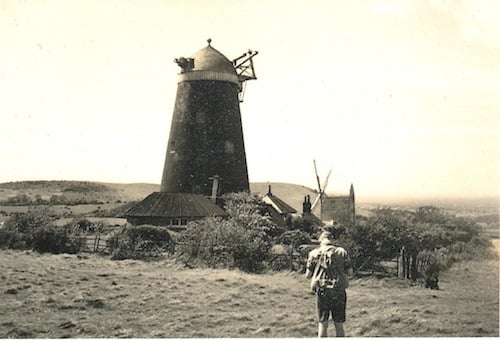
Silence again.
But the effort of recalling these facts had drawn Jeremy back to human life; and presently he said with simplicity, “I love you… I love you…” She answered him, and they talked, telling one another of their feelings, exploring strange paths, making strange discoveries, each taking turns to draw the other aside, like two children together in a wood, one of whom points out the flowers, while the other, finger on lip, calls for silence to listen to the birds. As they talked in soft murmurs they forgot the cold and the passage of time: it was the longest converse they had ever held in intimacy. Thus it was not the gray light of morning stealing over the hill-side but the Speaker, who suddenly began to be restless and to cough and moan in his sleep, that first drew their attention from themselves.
Eva started hurriedly out of Jeremy’s embrace and went to the old man. He was in the grip of another attack; and his contorted face showed that he was suffering deeply. Jeremy followed her, and stood helplessly by while she arranged more comfortably the folded cloak under his head and drew over his body the wrappings which, as constantly, with aimless violent movements of his arms he threw off again. Then, as suddenly as the attack had begun, it seemed to pass. The old man grew calm and allowed himself to be covered. He settled on his back, folded his arms across his breast and threw back his head; and his breathing became more gentle. Jeremy discovered with a shock that the sunken and brilliant eyes were open and were intensely fixed on his. He opened his mouth to say he knew not what, but the Speaker had begun in a faint but distinct whisper.
“Jeremy, we were beaten —”
It was as though he had returned to the last moment of the battle, as though the three days of his aberration had not been, and he was saying now what he might have said them. But to Jeremy there was nothing but injustice in this long-suspended comment. He forgot where they were and what was their condition; and words of hot anger rose in his mouth. He was deceived for a moment by the serenity and calmness of the Speaker’s voice into thinking that this was indeed the man who had tyrannically driven them all into disaster by his ungovernable will.
“You —” shaped itself on his lips, never spoken; for the girl plucked in terror at his arm and at the same moment he stopped, jaw dropping, eyes starting and hands hanging as though the tendons of the wrists had been cut. For the old man was dead.
Eva threw herself down beside the body and pressed her lips on her father’s cold forehead. Then realizing that what she had dreaded was true, that the final event had taken place, she slipped helpless to one side, sobbing violently with dry eyes and convulsed mouth. Jeremy looked from the dead man to the grief-racked girl, impotent and abased. This was the end of the old man’s schemes and efforts, his life-long devotion, his last sufferings — this cold and miserable death, in the beginning of the morning, on a bare hill in the country that was no longer his own to scheme for. In the contemplation of the body Jeremy felt for a moment relieved of human desires, contemptuous of what demanded so much pains for so small a reward.
But while he stood thus he realized for the first time how light it had grown. All the down was dimly revealed, the sun was on the point of rising, and faint mists, curling off the fields, obscured the distances. But close at hand the grove in which they had hidden, and the bank against which they had rested, were plainly shown. Again a sense of staggering recognition invaded Jeremy’s brain, and he did not know in what world or what time he was living. Then in a flash he was enlightened.
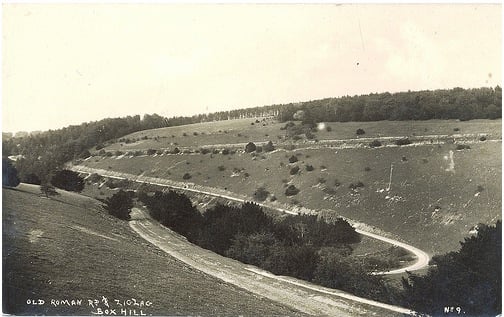
“The Roman road!” he exclaimed, forgetting the dead and living companions who lay at his feet. For the long bank, overgrown and almost hidden, extending into the mist on either side, was the Stane Street, running over the downs like an arrow to Bignor Hill. A pure wonder overcame Jeremy, and he went nearer to the road, touched the high unmistakable stony mound and followed its trace with his eyes. He remembered it, having tracked it without any difficulty from near Halnaker Hill through the Nore Wood, past Gumber Farm and past this very place, no longer ago than — no longer ago than the year 1913. The month had been September, and blackberries had been very thick in the hedges. He was bewildered and the waking earth turned dizzily round him, while the tragedy in which he had just taken a part and which was perhaps to continue, sank into the category of small and negligible things. It seemed to take its place with the road and everything else in a fantasy of idle invention.
He recovered himself when Eva touched him lightly on the arm. She was self-possessed again, save that she was trembling violently and that her beautiful face was drawn and pale. He wished to explain to her what had thus struck him dumb, but she whispered.
“Look! Look down there!”
The sun was now just up, the mists were fast clearing, and the open spaces and long shadows of the hill-side and the plain were very distinct. As he followed her pointing finger, he saw a line of little figures, a mile away, spread out as though they were beating the ground, advancing slowly up the hill.
“The Welsh!” he uttered, somberly and without agitation. This was what he had known and expected, and his heart did not beat a fraction the faster for it. When he looked at Eva, she too was calm, almost rigid, waiting for his next word.
“We must creep up through the bushes,” he whispered, as though the enemy had been already within earshot. “Perhaps we can get away from them in the woods up there.” She nodded, and while he unstrapped his pistols and saw that they were loaded, she bent over her father, disposed his limbs and covered his face with her cloak. Then she put her hand in Jeremy’s, saying only.
“We must leave him. We could do nothing for him.”
Without another glance at the dead man, they began to hurry, bending almost double, beside the bank of the road, stumbling over roots and avoiding the swinging-bushes as best they could. Once or twice they had to dash across open spaces where the ancient road had disappeared, gaps kept clear by old cart-tracks or a shepherd’s path; and once, where the bushes clustered too thickly, they had to leave shelter and run for a hundred yards in the bare field.
As they ran, hand in hand, torn and impeded by the briars, growing more and more exhausted, Jeremy owned to himself, without a conscious shaping of the thought, that they were lost, that they had too small a start of their pursuers, and that these pursuers were acting in a careful and methodical way, which was an ill omen. But he was dazed and rendered distraught by the surroundings of their flight. With one part of his mind he felt no more than the animal’s impulse to run for safety, carrying his mate with him. With the rest he was revolving loosely the odd chance that had landed them thus in familiar country and by the side of this great deserted causeway, a remnant of antiquity on which he had once looked with the feelings of awe and wonder that these people now bestowed on the vestiges of his own days. It was to this side of him that the landscape was growing increasingly familiar, seeming to drag him back into his own natural century, away from all the violent and incredible events of the last few weeks, away from the bravely struggling girl at his side… He felt her pull on his hand grow heavier, felt that she was stumbling more and more. Then the Nore Wood showed, obscure and gloomy ahead of them, and at the same moment Jeremy glanced through a gap in the bushes and saw, at the bottom of a gentle slope, Gumber Farm, the old weathered building with its small windows and the well in front of it, and a woman standing in a half-opened door, emptying out a bucket on the ground. Why run so painfully, he wondered, through a world that could not but be a dream? He halted suddenly and dragged Eva back. A few hundred yards in front of them, at the point where the Stane Street entered the wood, was a soldier on horseback, a dark, motionless, watchful figure, the long barrel of his pistol lying in the crook of his arm and shining in a stray beam of the sun.
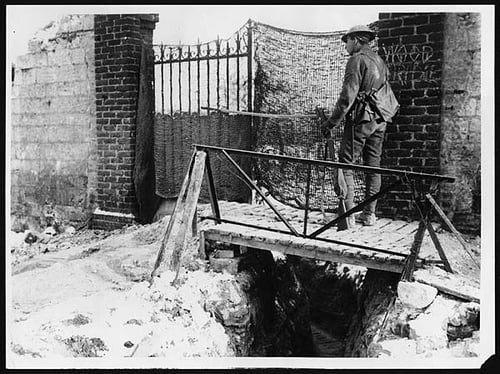
“No good going on,” he panted. “We must lie close somewhere for a bit.” Eva said nothing and he saw that her face was white, her lips pressed together closely, her eyes half shut. Her free hand was clasped to her side, she was bending backwards from the waist, and her breath came and went in short convulsive gasps.
Near them, starting out of the growth on the old road and running down the slope of the hill, was another black hedge which seemed to lead to a little wooded knoll. Without speaking, Jeremy pulled Eva towards it, and keeping close in the shelter of the bushes they reached it without hearing any cry that showed they had been discovered. They scrambled to the top, which was some twenty feet above the level of the neighboring fields, and lay for a few moments, face downwards, exhausted and oblivious among the gorse and bracken. Then Jeremy recovered, sat up and surveyed their position. They were well hidden, and, by peering through the branches, they could watch all the country for some distance round. His hopes began to revive a little. They might even, with great good fortune, lie here unperceived while the trackers passed by: at the worst the cover was enough to help him to offer some encouragement to Eva. And his chief thought was to restore her, to see her breathe easily again, and the color come back to her cheeks, to stanch the blood that trickled from a deep scratch on her forehead, to kiss and hold her torn hands. If the very worst should happen and they were found — His thoughts broke off and he looked at her in agony, fearing to meet her eyes. She too had sat up and was fumbling in the bosom of her dress, as though looking for something.
When she saw that he was gazing at her she smiled faintly and said in a natural tone, “At any rate we can rest now.” Then she began to rearrange her skirts, to put the tumbled folds into place, as well as the great rents in them would allow, and to smooth the disordered strands of her hair.
“Rest. Yes, we can rest,” he answered somberly. And then he thought how adorable she looked and, bending over towards her without rising, took her in his arms and kissed her; and she returned his kisses. Presently they released one another, and Jeremy murmured, almost in a whisper.
“How quiet it is! You wouldn’t think there was, any one in the downs but us.” And as she made no, reply he went on, “Do you know what that bank was? It was a road built by the Romans more than two thousand years ago. Travelers and regiments of, soldiers used to march over it, though it’s so lonely now.” He broke off and stared abstractedly at the ground. “That seems a strange thing to talk about just now when we… when we…” He stopped altogether. She came closer to him, put her arm round his shoulder and drew his head down on her breast. Then she began gently to stroke his hair and there was infinite solace in her touch. He wondered whether he ought to discuss with her what they should do if they were discovered; but the pain of that thought was so great that it drove him back before he even felt it. He dared not… he dared not… he owned his cowardice. He let it go, closed his eyes and abandoned himself to the sweetness of her caresses.
Once more time vanished and became an unreal thing. It seemed an eternity before he opened his eyes again; but when he did so, lazily, it was to see the black remorseless figures of the pursuers spread out in a long crescent in the field below, half a mile away. Every muscle in his body stiffened, he felt his lips curling back from his teeth like those of a fighting animal, and he sat up abruptly and grasped his pistol. They were coming quite close, and they were searching all the hill-side with methodical care, advancing with regular and terrifying deliberation. Perhaps they had been led thus far by foot-prints and broken branches and rags left fluttering on the thorns, and now were casting about for further signs.
Jeremy turned and again took Eva into his arms, and pressed his mouth on hers. The kiss continued, seemed endless, was intolerably sweet and bitter, a draught not like any he had ever known. Then he broke away, saw with minute care to the readiness of his pistol, and bent forward, watching intently the approaching Welshmen. Eva, sitting a little behind him, again slipped her hand into his and held it with a firm clasp which, though he could no longer see her, conveyed to him all her sweetness and her love. Thus they waited without moving, they did not know how long, while the trackers advanced, vanished in a fold of the ground, began to emerge again. Then one of them uttered a harsh piercing view-halloo, that echoed horribly through the empty fields and sky; and in the next moment Jeremy felt Eva’s hand tighten on his convulsively and then a weight behind it, dragging it back. He forgot the enemy, forgot his resolution to kill as many as he could of these hateful savages before he was himself destroyed. But when he swung round the girl had fallen on her back, and was staring upwards, her eyes and her lips quite peaceful, the pallor on her face no longer that of fear and exhaustion, but now the serene and even pallor of death. In her free hand lay open the little metal box which once she had taken from her foolish waiting-maid; and it was empty.
Jeremy did not rave or cry out, but an immense weariness overcame him, in which those who were approaching slipped altogether from his thoughts. Was it for this, he wondered, staring vacantly at the familiar English country around him, that he had come so far and done and suffered so much? All were gone now, all were enveloped in a common darkness, those friends of his earlier life and his new friends, the old, vehement Speaker, poor Roger Vaile, and, last and dearest of them, the Lady Eva, to find whom a century and a half asleep in the grave had been a slight and welcome preparation. What was he doing here? The Welsh were coming, the Welsh had sacked London, they had taken England in their ravening jaws. He had a vision of the world sinking further below the point from which in his youth he had seen it, still on a level with him. Cities would be burnt, bridges broken down, tall towers destroyed and all the wealth and learning of humanity would shiver to a few shards and a little dust. The very place would be forgotten where once had stood the houses that he knew; and the roads he had walked with his friends would be as desolate and lonely as the Stane Street of the Romans. Even all this story, his victory and his defeat, his joy and his sorrow, would fade out of the memory of man. But what did it all matter to Jeremy Tuft, who, wonder and portent that he was, strange anachronism, unparalleled and reluctant ambassador from one age to the next, had suffered in the end that common ill, the loss of his beloved? He raised the pistol to his head and fired.
* Stane Street: Stane Street is the modern name given to an important 90 km (56 mi) long Roman road in England that linked London to the Roman town of Noviomagus Reginorum, or Regnentium, later renamed Chichester by the Saxons. At Hardham, there was a junction with the Greensand Way Roman road to Lewes and a posting station near the junction. From here the alignment makes a beeline for Chichester, and passes the notable Roman villa at Bignor, before making a slight detour from the line where it climbs the escarpment of the South Downs, climbing a spur of chalk at Bignortail Wood and continuing as a man made terrace across the steep hillside. Walking south from Bignor Hill one soon comes to open sheep-grazed pasture at Gumber farm where the scale of the agger of the road can be clearly seen.
RADIUM AGE SCIENCE FICTION: “Radium Age” is HILOBROW’s name for the 1904–33 era, which saw the discovery of radioactivity, the revelation that matter itself is constantly in movement — a fitting metaphor for the first decades of the 20th century, during which old scientific, religious, political, and social certainties were shattered. This era also saw the publication of genre-shattering writing by Edgar Rice Burroughs, Sax Rohmer, E.E. “Doc” Smith, Jack London, Arthur Conan Doyle, Aldous Huxley, Olaf Stapledon, Karel Čapek, H.P. Lovecraft, Charlotte Perkins Gilman, Yevgeny Zamyatin, Philip Gordon Wylie, and other pioneers of post-Verne/Wells, pre-Golden Age “science fiction.” More info here.
HILOBOOKS: The mission of HiLoBooks is to serialize novels on HiLobrow; and also, as of 2012, operating as an imprint of Richard Nash’s Cursor, to reissue Radium Age science fiction in beautiful new print editions. So far, we have published Jack London’s The Scarlet Plague, Rudyard Kipling’s With the Night Mail (and “As Easy as A.B.C.”), Arthur Conan Doyle’s The Poison Belt, H. Rider Haggard’s When the World Shook, Edward Shanks’s The People of the Ruins, William Hope Hodgson’s The Night Land, and J.D. Beresford’s Goslings. Forthcoming: E.V. Odle’s The Clockwork Man, Cicely Hamilton’s Theodore Savage, and Muriel Jaeger’s The Man with Six Senses. For more information, visit the HiLoBooks homepage.
READ: Jack London’s The Scarlet Plague, serialized between January and April 2012; Rudyard Kipling’s With the Night Mail (and “As Easy as A.B.C.”), serialized between March and June 2012; Arthur Conan Doyle’s The Poison Belt, serialized between April and July 2012; and H. Rider Haggard’s When the World Shook, serialized between March and August 2012.
ORIGINAL FICTION: HILOBROW has serialized three novels: James Parker’s The Ballad of Cocky The Fox (“a proof-of-concept that serialization can work on the Internet” — The Atlantic) and Karinne Keithley Syers’s Linda Linda Linda. We also publish original stories and comics.
